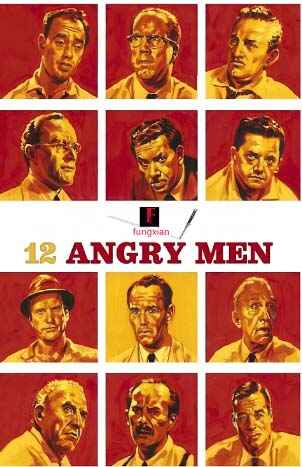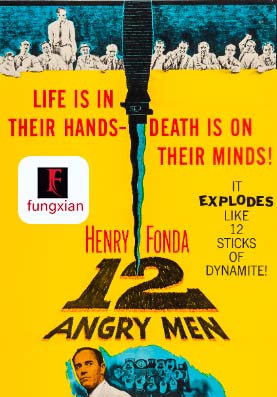“12 Angry Men 1997 Cast”, “12 Angry Men,” an iconic masterpiece in the realm of cinema, delves deep into the intricacies of justice, morality, and the human condition. Directed by Sidney Lumet and released in 1957, this timeless classic takes us inside a single jury room, where twelve jurors are tasked with deciding the fate of a young man accused of murder. What unfolds is not just a gripping courtroom drama but a profound exploration of the complexities of human nature, prejudice, and the power of reasoned argument. With a stellar cast, brilliant direction, and a storyline that has stood the test of time, “12 Angry Men” continues to be a thought-provoking and relevant cinematic experience.
Table of Contents
| Main Genre | Drama |
| Released Date | April 10, 1957 |
| Original Country | United States |
| Original language | English |
| Duration | Approximately 96 Minutes |
| Rating | 8.9/10 IMDb |
| Budget | Approximately $350,000 |
| Earning | Approximately $2 million |
| Hit Song | |
| Famous Dialogues | “It’s not easy to stand alone against the ridicule of others.” Juror #8 (Henry Fonda) |
| Awards | Edgar Allan Poe Awards (Edgar Awards) Academy Awards (Oscars) Golden Globe Awards BAFTA Awards |
Henry Fonda – 12 Angry Men 1997 Cast
- Character Overview: “12 Angry Men 1997 Cast”, Henry Fonda portrays Juror 8, also known as Davis, in “12 Angry Men.” He is the central character around whom the story revolves. Juror 8 is introduced as an architect who approaches the case with a sense of responsibility and moral duty. His character represents the voice of reason and justice within the jury room.
- Key Role in the Story: Juror 8 plays a pivotal role in the film by initiating the reevaluation of the case. He is the first to cast a “not guilty” vote, sparking a thorough examination of the evidence and a reconsideration of the defendant’s guilt. His unwavering commitment to justice sets the tone for the entire deliberation process.
- Personification of Morality: Fonda’s portrayal of Juror 8 emphasizes the character’s unwavering moral compass. He approaches the case with integrity, compassion, and a deep sense of responsibility. Fonda’s performance highlights Juror 8 as a paragon of virtue and fairness.
- Influence on the Jury: Juror 8’s rational thinking and persistence have a profound impact on the other jurors. He encourages them to question their preconceived notions and biases, urging them to carefully review the evidence and testimony. His leadership in the jury room becomes instrumental in the pursuit of justice.
- Actor’s Impact: Henry Fonda’s portrayal of Juror 8 is a masterclass in conveying moral courage and leadership on screen. His calm and rational demeanor, combined with an unwavering commitment to the truth, makes Juror 8 a character who stands out as a beacon of justice in the film.
Lee J. Cobb (Juror 3 – Lee):
- Character Overview: “12 Angry Men 1997 Cast”, Lee J. Cobb embodies Juror 3, named Lee, in “12 Angry Men.” He is a central character known for his unwavering conviction that the defendant is guilty. Juror 3 is introduced as a volatile and emotionally charged individual who struggles with his own personal demons.
- Driving Conflict: Juror 3’s unwavering belief in the defendant’s guilt becomes the primary source of conflict within the jury room. His strong, confrontational stance creates intense and emotionally charged debates, leading to confrontations with Juror 8.
- Emotional Intensity: Cobb’s portrayal of Juror 3 adds depth and emotional intensity to the character. His explosive anger and emotional outbursts contribute significantly to the film’s overall tension and drama. Juror 3’s personal turmoil is palpable through Cobb’s performance.
- Exploration of Prejudice: Juror 3 exemplifies the dangers of personal bias and unresolved anger. His character becomes a symbol of prejudice and the impact it can have on decision-making within the justice system. Cobb’s performance highlights the destructive nature of these biases.
- Dramatic Impact: Lee J. Cobb’s performance as Juror 3 is instrumental in shaping the dramatic atmosphere of “12 Angry Men.” His ability to convey the character’s emotional turmoil and his relentless pursuit of a guilty verdict adds depth and complexity to the film’s conflicts and character dynamics.
Ed Begley (Juror 10 – Ritter):
- Character Overview: “12 Angry Men 1997 Cast”, Ed Begley plays Juror 10, referred to as Ritter in the film. Juror 10 is a character notable for openly expressing prejudiced views during the jury deliberations. He represents a significant theme in the story: prejudice and intolerance.
- Personification of Bigotry: Juror 10 personifies bigotry and intolerance within the jury room. His character is openly racist and intolerant, making him a central figure in highlighting the theme of bias and discrimination in the legal system.
- Chilling Portrayal: Ed Begley’s performance delivers a chilling depiction of the dangers of bias within the jury. His character’s unapologetic and hate-filled rants serve as a stark reminder of the real-world consequences of prejudice.
- Theme of Discrimination: Juror 10 underscores the film’s theme of discrimination and its impact on decision-making. Begley’s character serves as a stark example of how bias and hatred can cloud judgment and influence the pursuit of justice.
- Tension and Discomfort: Begley’s acting adds an uncomfortable layer to the jury room dynamics. His character’s expressions of prejudice create an atmosphere of tension and discomfort, emphasizing the challenges that arise when personal biases are brought into the deliberation process.
E.G. Marshall (Juror 4 – McCardle):
- Character Overview: “12 Angry Men 1997 Cast”, E.G. Marshall portrays Juror 4, known as McCardle, in “12 Angry Men.” He is depicted as an intelligent, analytical, and logical juror who approaches the case with a commitment to thorough examination.
- Rational Approach: Juror 4 stands out for his rational approach to decision-making. He relies on facts, evidence, and a logical thought process to reach his conclusions. His character is often seen as a counterbalance to emotional arguments in the jury room.
- Contribution to Discourse: McCardle’s character contributes significantly to the intellectual discourse within the jury. He engages in thoughtful analysis and reasoned debate, helping to bring a methodical approach to the deliberation process.
- Emphasis on Objectivity: E.G. Marshall’s portrayal underscores the importance of objectivity in the deliberation process. Juror 4 serves as a reminder of the significance of examining the case impartially and without preconceived notions.
- Intellectual Analysis: Marshall’s performance highlights the role of careful examination and intellectual rigor in achieving a just verdict. Juror 4’s character exemplifies the importance of critical thinking in the pursuit of justice.

Jack Klugman (Juror 5 – McIlvain):
- Character Overview: “12 Angry Men 1997 Cast”, Jack Klugman embodies Juror 5, also known as McIlvain, in the film. McIlvain is a young juror with a background in a neighborhood similar to the defendant.
- Insights from Personal Background: McIlvain’s character brings valuable insights to the deliberation process based on his personal background and life experiences. His familiarity with the circumstances of the accused sets him apart.
- Portrayal of Empathy: Jack Klugman’s performance conveys a sense of empathy and a connection to the accused. He often takes a more compassionate stance during deliberations, considering the defendant’s circumstances.
- Diverse Perspectives: Juror 5’s character highlights the importance of considering the defendant’s background and life circumstances. His viewpoint adds depth to the discussion by bringing a unique perspective to the jury’s deliberations.
- Character Transformation: McIlvain’s character undergoes a transformation during the course of the story. Initially, he is somewhat reserved and hesitant, but as the deliberations unfold, he gains confidence and assertiveness, making him an essential part of the evolving dynamics within the jury room.
Jack Warden (Juror 7 – Bagby):
- Character Overview: “12 Angry Men 1997 Cast”, Jack Warden portrays Juror 7, known as Bagby. This character is often seen as indifferent to the case at hand, preoccupied with personal matters, and more interested in attending a baseball game.
- Representation of Indifference: Bagby is the personification of indifference during the jury deliberations. His character illustrates the challenge of maintaining focus and seriousness when dealing with such a critical matter.
- Realism in the Story: Jack Warden’s portrayal adds an element of realism to the story. Bagby’s nonchalant attitude represents the reality that not all jurors approach their responsibilities with the same level of seriousness.
- Amidst the Tension: In a room filled with tension and strong personalities, Bagby’s character stands out as a counterpoint. His casual demeanor contrasts sharply with the fervent debates happening around him.
- Reflecting Juror Diversity: Bagby’s character serves as a reminder that jurors come from various backgrounds and temperaments, making the deliberation process complex and unpredictable.
Martin Balsam (Juror 1 – Davis – Foreman):
- Character Overview: “12 Angry Men 1997 Cast”, Martin Balsam plays Juror 1, the jury foreman who shares the same last name as Henry Fonda’s character, Davis. He takes on the role of maintaining order and facilitating the deliberations.
- Leadership and Responsibility: Juror 1 is responsible for leading the deliberations and ensuring that the discussions remain organized and focused. Balsam’s character embodies a sense of duty and leadership.
- Attempt to Keep Order: Throughout the film, Juror 1 attempts to keep order and decorum within the jury room. He plays a pivotal role in managing the various personalities and conflicts among the jurors.
- Maintaining a Fair Process: Balsam’s portrayal emphasizes the importance of conducting a fair and structured deliberation process, ensuring that each juror has the opportunity to express their views.
- Balancing Responsibilities: The character’s role reflects the complex balance of maintaining order while respecting the individual voices of the jurors, making him an essential figure in the jury dynamics.
John Fiedler (Juror 2 – McCardle):
- Character Overview: “12 Angry Men 1997 Cast”, John Fiedler takes on the role of Juror 2, who is also named McCardle. He is initially portrayed as a timid and nervous juror who gradually gains confidence and assertiveness.
- Character Transformation: Fiedler’s portrayal showcases McCardle’s transformation during the deliberations. He evolves from a shy and hesitant juror into a more assertive and active participant.
- Growing Confidence: The character’s growing confidence reflects the impact of the deliberations and discussions on individual jurors. McCardle’s journey highlights the power of open dialogue and reasoned debate.
- Contribution to Debate: As McCardle gains confidence, he becomes a more active contributor to the discussions. Fiedler’s portrayal underscores the significance of every juror’s input in reaching a just verdict.
- Evolution of Character Dynamics: The character’s transformation adds depth to the evolving dynamics within the jury room, showcasing the influence of different personalities on one another.
Robert Webber (Juror 6 – Faulkner):
- Character Overview: “12 Angry Men 1997 Cast”, Robert Webber portrays Juror 6, known as Faulkner. He is presented as a blue-collar worker who brings his life experience into the deliberations.
- Working-Class Sensibilities: Faulkner’s character represents blue-collar sensibilities and a practical approach to the case. Webber’s portrayal highlights the character’s connection to the working-class perspective.
- Diverse Backgrounds: The character’s background and experiences demonstrate the diversity of the jury. Jurors come from various walks of life, each bringing their unique viewpoint to the deliberation.
- Contributing Insights: Faulkner’s character contributes insights based on his life experience, adding a layer of authenticity to the discussions. Webber’s performance emphasizes the importance of considering different perspectives.
- Role in the Group: Juror 6, through Webber’s portrayal, plays a significant role in highlighting the influence of individual backgrounds and experiences on the group’s dynamics and decision-making.
Rudy Bond (Judge):
- Character Overview: “12 Angry Men 1997 Cast”, Rudy Bond plays the role of the Judge presiding over the murder trial. While the Judge’s role is brief, it is essential to the story.
- Solemn Authority: The character of the Judge conveys solemn authority and the formal nature of the courtroom proceedings. Bond’s portrayal reflects the judicial system’s seriousness.
- Brief but Impactful: Although the Judge’s appearance in the film is limited to a few moments, his presence sets the tone for the trial and underscores the gravity of the proceedings.
- Legal Realism: Rudy Bond’s performance adds a layer of legal realism to the film, reminding viewers of the formalities and procedures associated with a trial.
- Contribution to the Setting: The Judge’s character contributes to the authenticity of the courtroom setting, creating an environment that is integral to the story’s context.
Tom Gorman (Stenographer):
- Character Overview: “12 Angry Men 1997 Cast”, Tom Gorman plays the Stenographer, who is responsible for transcribing the trial proceedings.
- Supporting Role: The Stenographer’s role is supportive but important in maintaining a record of the trial. Gorman’s portrayal reflects the character’s professional role in the courtroom.
- Authenticity to Courtroom Scenes: The Stenographer’s character adds authenticity to the courtroom scenes, ensuring that the trial is accurately recorded, as is common in legal proceedings.
- Contribution to Realism: Gorman’s performance underscores the film’s commitment to realism and accuracy in portraying the legal process, even in a supporting role.
- Contextual Role: While the Stenographer’s character has limited screen time, their presence adds context and depth to the courtroom scenes and proceedings.

Joseph Sweeney (Juror 9 – McCardle):
- Character Overview: “12 Angry Men 1997 Cast”, Joseph Sweeney plays Juror 9, who shares the same name, McCardle, with Juror 4 (played by E.G. Marshall). Juror 9 is portrayed as an elderly man with a quiet and observant nature.
- Wisdom and Experience: Juror 9’s character brings wisdom and life experience to the jury room. Sweeney’s portrayal reflects the depth of knowledge and understanding that comes with age.
- Observational Skills: Throughout the film, Juror 9 is portrayed as an observant individual who notices subtle details and nuances in the case. Sweeney’s performance emphasizes the importance of careful observation in the pursuit of justice.
- Respect and Empathy: The character’s respectful demeanor and empathy for others make him an important figure in the jury room. Sweeney’s acting highlights the value of respecting different viewpoints and understanding the human elements of the case.
- Voice of Reason: Juror 9 often serves as a voice of reason, using his experience and insights to contribute to the deliberations. Sweeney’s portrayal underlines the significance of every juror’s unique perspective in reaching a fair verdict.
Ed Binns (Juror 6 – Faulkner):
- Character Overview: “12 Angry Men 1997 Cast”, Ed Binns takes on the role of Juror 6, named Faulkner, who is portrayed as a blue-collar worker and is among the jurors from various backgrounds.
- Working-Class Perspective: Faulkner represents the working-class perspective in the jury room, reflecting the experiences and sensibilities of individuals from this background.
- Practical and Grounded: The character is depicted as practical and grounded, often offering insights based on common sense and his own life experience. Binns’ portrayal adds authenticity to the character.
- Diverse Contributions: Faulkner’s character contributes to the diversity of viewpoints within the jury, highlighting how jurors from different walks of life bring their unique insights and perspectives to the deliberation.
- Role in Group Dynamics: Ed Binns’ performance showcases how the character of Juror 6 plays a role in shaping the dynamics of the group, contributing to the complex discussions and interactions in the jury room.
George Voskovec (Juror 11 – Velasco):
- Character Overview: George Voskovec portrays Juror 11, who is referred to as Velasco. He is depicted as an immigrant and watchmaker.
- Immigrant Perspective: Juror 11’s character adds a unique perspective to the deliberations as an immigrant. Voskovec’s portrayal highlights the challenges and aspirations of newcomers to a country.
- Precision and Detail: The character’s background as a watchmaker reflects precision and attention to detail, which he brings into the discussions. Voskovec’s acting underscores the value of careful examination.
- Cultural Sensitivity: Juror 11’s character is depicted as respectful of others and their perspectives, reflecting cultural sensitivity. Voskovec’s performance emphasizes the importance of understanding and appreciating diversity.
- Contribution to Fairness: The character’s presence underscores the pursuit of fairness and justice within the jury room. Voskovec’s portrayal showcases how different backgrounds and experiences can enrich the deliberation process.
Tom Gorman (Guard):
- Character Overview: Tom Gorman plays the role of the Guard, a security officer responsible for maintaining order during the trial and jury deliberations.
- Role of Authority: The Guard’s character embodies authority and the responsibility of ensuring the safety and decorum of the courtroom and jury room. Gorman’s portrayal reflects the role’s seriousness.
- Enforcement of Rules: The Guard is responsible for enforcing the rules and procedures within the court. Gorman’s performance adds an element of legal realism to the film.
- Order and Security: The character’s presence emphasizes the importance of order and security in the legal process. Gorman’s portrayal adds authenticity to the courtroom scenes.
- Supporting the Legal Setting: While the Guard’s role is supportive and brief, it contributes to the authentic portrayal of the legal setting, ensuring that the proceedings are conducted in an organized and controlled manner.
ALSO READ:- Mirzapur Cast
ALSO READ:- Mirzapur Season 3
ALSO READ:- Titanic Movie
ALSO READ:- The Killer Movie
ALSO READ:- The Cast Of Avatar 2
ALSO READ:- PK Movie
ALSO READ:- Lady Gaga Joker Movie
ALSO READ:- Emergency Movie
ALSO READ:- Breaking Bad Cast
ALSO READ:- Inception Movie
ALSO READ:- The Godfather
ALSO READ:- Dangal Movie
ALSO READ:- Mission Raniganj Movie










